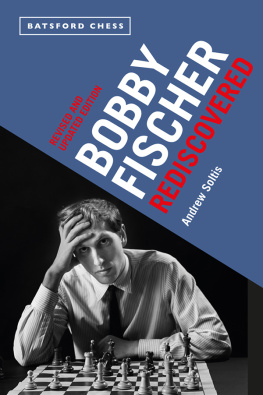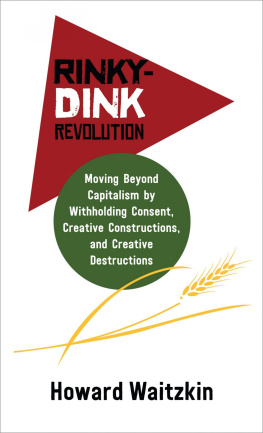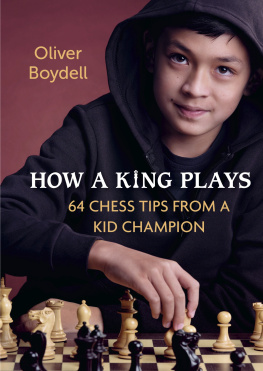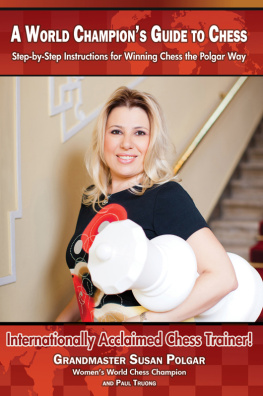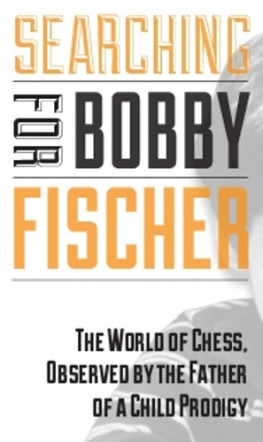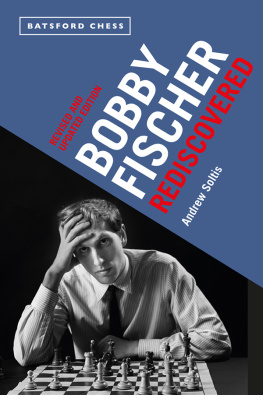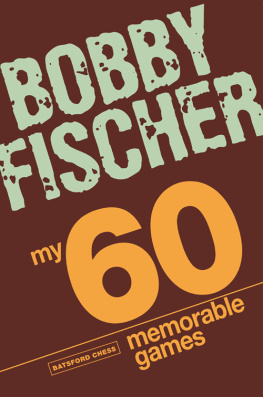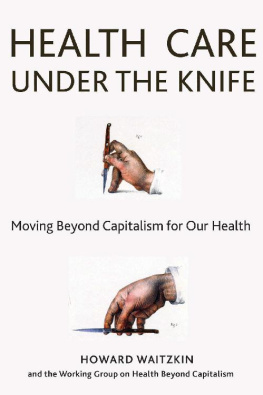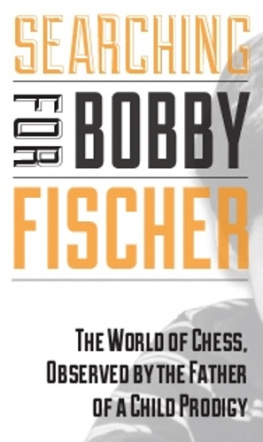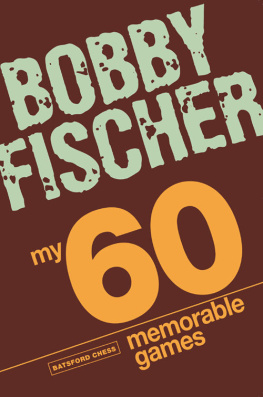Thank you for downloading this Free Press eBook.
Join our mailing list and get updates on new releases, deals, bonus content and other great books from Free Press and Simon & Schuster.
C LICK H ERE T O S IGN U P
or visit us online to sign up at
eBookNews.SimonandSchuster.com
We hope you enjoyed reading this Free Press eBook.
Join our mailing list and get updates on new releases, deals, bonus content and other great books from Free Press and Simon & Schuster.
C LICK H ERE T O S IGN U P
or visit us online to sign up at
eBookNews.SimonandSchuster.com
Praise for The Art of Learning
We all remember the portrayal of Josh Waitzkin in Searching for Bobby Fischer . He was a very impressive child who continues to impress with The Art of Learning . Through a unique set of experiences, Waitzkin has formed an original and outstanding perspective. From chess to Tai Chi, he provides tools that allow all of us to improve ourselves every day.
Cal Ripken, Jr., 2007 Baseball Hall of Fame Inductee
Waitzkins engaging voice and his openness... make him a welcome teacher.
Publishers Weekly
A vibrant and engaging look at the love of learning and the pursuit of excellence.
Booklist
The Art of Learning succeeds on every level, by combining a truly compelling autobiography with profound philosophical and psychological insights, all wrapped in a practical how-to framework. This is a must-read for anyone wishing to achieve that rare combination of success and fulfillment.
Paul Blease, SVP, Director Team Development & Consulting, Citigroup Smith Barney
Waitzkins in-depth look into the mental side of his success in both chess and martial arts is an inspiring and absorbing read. I strongly recommend it for anyone who lives in a world of competition, whether its sports or business or anywhere else. Its also a great training tool for kids aspiring to reach the pinnacle of their chosen fields.
Mark Messier, 6-time Stanley Cup Champion
The title is accurateat a profound level, its about real learning from hard conflict rather than from disinterested textbooks.
Robert Pirsig, author of Zen and the Art of Motorcycle Maintenance
Also by Josh Waitzkin
ATTACKING CHESS

FREE PRESS
A Division of Simon & Schuster Inc.
1230 Avenue of the Americas
New York, NY 10020
www.SimonandSchuster.com
Copyright 2007 by Josh Waitzkin LLC
All rights reserved, including the right to reproduce this book or portions thereof in any form whatsoever. For information address Free Press Subsidiary Rights Department, 1230 Avenue of the Americas, New York, NY 10020
First Free Press trade paperback edition May 2008
F REE P RESS and colophon are trademarks of Simon & Schuster, Inc.
Part pages photo credits:
: Josh at the Manhattan Chess Club, age seven. Photo by Bonnie Waitzkin.
: Training for the 2002 Worlds. Photo by Andrew Kist.
: The second to last throw of the Finals, 2004 World Championships. Courtesy of the author.
DESIGNED BY ERICH HOBBING
Library of Congress Cataloging-in-Publication Data Control Number: 2006052539
ISBN 13: 978-0-7432-7745-7
ISBN 10: 0-7432-7745-7
ISBN 13: 978-0-7432-7746-4 (pbk)
ISBN-10: 0-7432-7746-5 (pbk)
ISBN-13: 978-1-4165-3886-8 (eBook)
For my mom, my hero, Bonnie Waitzkin
CONTENTS
INTRODUCTION
One has to investigate the principle in one thing or one event exhaustively... Things and the self are governed by the same principle. If you understand one, you understand the other, for the truth within and the truth without are identical.
Er Cheng Yishu, 11th century
Finals: Tai Chi Chuan Push Hands World Championships Hsinchuang Stadium, Taipei, Taiwan December 5, 2004
Forty seconds before round two, and Im lying on my back trying to breathe. Pain all through me. Deep breath. Let it go. I wont be able to lift my shoulder tomorrow, it wont heal for over a year, but now it pulses, alive, and I feel the air vibrating around me, the stadium shaking with chants, in Mandarin, not for me. My teammates are kneeling above me, looking worried. They rub my arms, my shoulders, my legs. The bell rings. I hear my dads voice in the stands, Cmon Josh! Gotta get up. I watch my opponent run to the center of the ring. He screams, pounds his chest. The fans explode. They call him Buffalo. Bigger than me, stronger, quick as a cat. But I can take himif I make it to the middle of the ring without falling over. I have to dig deep, bring it up from somewhere right now. Our wrists touch, the bell rings, and he hits me like a Mack truck.
Who could have guessed it would come to this? Just a few years earlier I had been competing around the world in elite chess tournaments. Since I was eight years old, I had consistently been the highest rated player for my age in the United States, and my life was dominated by competitions and training regimens designed to bring me into peak form for the next national or world championship. I had spent the years between ages fifteen and eighteen in the maelstrom of American media following the release of the film Searching for Bobby Fischer, which was based on my dads book about my early chess life. I was known as Americas great young chess player and was told that it was my destiny to follow in the footsteps of immortals like Bobby Fischer and Garry Kasparov, to be world champion.
But there were problems. After the movie came out I couldnt go to a tournament without being surrounded by fans asking for autographs. Instead of focusing on chess positions, I was pulled into the image of myself as a celebrity. Since childhood I had treasured the sublime study of chess, the swim through ever-deepening layers of complexity. I could spend hours at a chessboard and stand up from the experience on fire with insight about chess, basketball, the ocean, psychology, love, art. The game was exhilarating and also spiritually calming. It centered me. Chess was my friend. Then, suddenly, the game became alien and disquieting.
I recall one tournament in Las Vegas: I was a young International Master in a field of a thousand competitors including twenty-six strong Grandmasters from around the world. As an up-and-coming player, I had huge respect for the great sages around me. I had studied their masterpieces for hundreds of hours and was awed by the artistry of these men. Before first-round play began I was seated at my board, deep in thought about my opening preparation, when the public address system announced that the subject of Searching for Bobby Fischer was at the event. A tournament director placed a poster of the movie next to my table, and immediately a sea of fans surged around the ropes separating the top boards from the audience. As the games progressed, when I rose to clear my mind young girls gave me their phone numbers and asked me to autograph their stomachs or legs.
This might sound like a dream for a seventeen-year-old boy, and I wont deny enjoying the attention, but professionally it was a nightmare. My game began to unravel. I caught myself thinking about how I looked thinking instead of losing myself in thought. The Grandmasters, my elders, were ignored and scowled at me. Some of them treated me like a pariah. I had won eight national championships and had more fans, public support and recognition than I could dream of, but none of this was helping my search for excellence, let alone for happiness.
At a young age I came to know that there is something profoundly hollow about the nature of fame. I had spent my life devoted to artistic growth and was used to the sweaty-palmed sense of contentment one gets after many hours of intense reflection. This peaceful feeling had nothing to do with external adulation, and I yearned for a return to that innocent, fertile time. I missed just being a student of the game, but there was no escaping the spotlight. I found myself dreading chess, miserable before leaving for tournaments. I played without inspiration and was invited to appear on television shows. I smiled.
Next page

